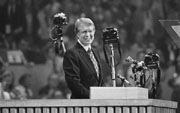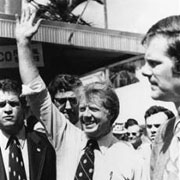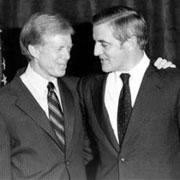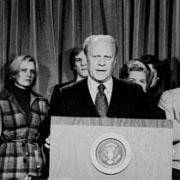VOA慢速英语2011--Little Known Democrat Defeats President Gerald Ford in 1976 Election
时间:2018-11-27 作者:英语课 分类:2011年VOA慢速英语(十二)月
THE MAKING OF A NATION - Little Known Democrat 1 Defeats President Gerald Ford 2 in 1976 Election
STEVE EMBER: Welcome to THE MAKING OF A NATION -- American history in VOA Special English. I’m Steve Ember.
This week in our series, we look back at the presidential election of nineteen seventy-six.
When Vice 3 President Gerald Ford became president in nineteen seventy-four, he took office during a crisis. For the first time in American history, a president -- Richard Nixon -- had resigned.
Nixon resigned as a result of the case known as Watergate. It involved the cover-up of illegal activities related to his re-election campaign. Lies about Watergate only added to the mistrust of Americans angry at having been misled about the war in Vietnam. After Vietnam and Watergate, many people no longer believed their public officials.
Voters rejected Gerald Ford, a Republican, in the presidential election of nineteen seventy-six. Instead they chose Jimmy Carter, the candidate of the Democrats 5. Why?
(MUSIC)

Jimmy Carter smiles at the crowd during the Democratic National Convention in New York on July 15, 1976
One reason was that Ford had pardoned Nixon. He declared a pardon for any crimes that Nixon might have committed. This made many people angry. Also, he refused requests for federal aid for New York and other cities. Voters may have felt that he was not concerned about the problems of poor people.
Others believe that unemployment and inflation defeated Gerald Ford. He was not able to deal effectively with these problems during his short presidency 6.
There was competition for the Republican Party nomination 7 in nineteen seventy-six. Ford's chief opponent was Ronald Reagan, who had just served two terms as governor of California.
Democrats thought that voter anger about Watergate would help their party win the White House. Eleven Democrats campaigned for the nomination. Two well-known politicians did not campaign, but they said they would serve if no other candidate won the party's support. They were former vice president Hubert Humphrey and Senator Ted 4 Kennedy.
One of the lesser-known candidates was the former governor of Georgia, Jimmy Carter.
JIMMY CARTER: “My name is Jimmy Carter, and I’m running for president.”
Political experts gave him little chance of winning the nomination. Most Democrats did not even know who he was.
(MUSIC)
Before becoming governor, he had been a nuclear power engineer in the Navy and a peanut farmer in Georgia. Again and again, he told people that he was not part of the political establishment in Washington. He also had strong Christian 8 beliefs. This appealed to a lot of voters.

Jimmy Carter greets supporters in downtown Fort Myers as he makes his presidential campaign swing through Florida in March of 1976
Many voters supported Carter in the primary elections leading up to the party's nominating convention. His victory in the Florida primary was especially important. He defeated another politician from the South, Governor George Wallace of Alabama.
Jimmy Carter represented what was called the "New South." He made it clear that he opposed the ideas of the "Old South," like discrimination against blacks.
George Wallace spoke 9 of creating a better life for both blacks and whites. Yet he had strongly defended racial separation for most of his political life. Many people remembered pictures of Governor Wallace at the University of Alabama in nineteen sixty-three. The pictures showed him blocking the door to prevent two young blacks from attending the school.
The Republican primaries had mixed results for President Ford.
PRESIDENT GERALD FORD: “Right now, I predict that the American people are going to say that night, ‘Gerry, you’ve done a good job – Keep right on doing it.’”
For example, in New Hampshire he won only fifty-one percent of the vote. Ronald Reagan won forty-nine percent. But in Massachusetts, Ford won twice as many votes as Reagan did.
The campaign showed that Reagan was more conservative than Ford. For example, Reagan talked strongly about United States control of the Panama Canal. In his words: "We built it, we paid for it, it's ours, and we are going to keep it." President Carter would later decide differently.
Ford, in his campaign speeches, denounced extremism. It was clear that he was talking about his opponent, Ronald Reagan.
Ford and Reagan won almost the same amount of support in the Republican primaries. Yet many delegates at the nominating convention remained undecided. This was a dangerous situation for the Republican Party. Party leaders did not want a fight over undecided votes at the convention. They worried that a lack of unity 10 could damage the party's chances in the general election.
The situation was similar for the Democrats. Support for Jimmy Carter increased. But some Democrats who did not like him began to say, "Anybody but Carter."
(MUSIC)
Carter's campaign message was that he did not have ties to special interest groups, that he would be different.
JIMMY CARTER (in campaign film): “I see an America that has turned away from scandals and corruption 11. I see an American president who governs with vigor 12 and vision and affirmative leadership. A president who is not isolated 13 from our people, but a president who feels your pain and who shares your dreams.
“I see an America on the move again, united, its wounds healed, an America entering its third century with confidence and competence 14 and compassion 15. An America that lives up to the majesty 16 of its Constitution, and the simple decency 17 of its people. This is my vision of America. I hope you share it. And I hope you will help me fight for it.”
Many people liked what they heard. Carter won the Democratic primaries in Georgia, Alabama and Indiana. The other candidates fell hopelessly behind.
At the party convention, he was nominated on the first vote. In his acceptance speech, he repeated the line that he continually used with voters.
JIMMY CARTER: “My name is Jimmy Carter, and I’m running for president.”
Carter said there was a fear that America's best years were over. He said the nation's best was still to come.
CARTER: “Nineteen seventy-six will not be a year of politics as usual. It can be a year of inspiration and hope, and it will be a year of concern, of quiet and sober reassessment of our nation’s character and purpose, a year when voters have confounded the experts. And I guarantee you that it will be the year when we give the government of this country back to the people of this country.” [Cheering]
Walter Mondale, a senator from Minnesota, became the party's vice presidential candidate.
(MUSIC)

President Jimmy Carter, left, and Vice President Walter Mondale
A month before the Republican Party convention, Ronald Reagan made a costly 18 political mistake. He said that, if he won the nomination, he would want Senator Richard Schweiker of Pennsylvania as his running mate. Conservatives got angry. Schweiker was a liberal Republican. Some political observers say this is why Reagan lost the nomination to President Ford.
Many of the delegates wanted Reagan to then be Ford's running mate. But Reagan was not interested in becoming vice president. Instead, the nominee 19 was Senator Robert Dole 20 of Kansas.
Nonetheless, Reagan received a long and enthusiastic response from the convention delegates when Gerald Ford motioned for him to come down and join him at the podium.
RONALD REAGAN: “If I could just take a moment, I had an assignment the other day. Someone asked me to write a letter for a time capsule that is going to opened in Los Angeles a hundred years from now.
“We live in a world in which the great powers have poised 21 and aimed at each other horrible missiles of destruction, nuclear weapons that can in a matter of minutes arrive at each other’s country and destroy virtually the civilized 22 world we live in.
“And suddenly it dawned on me; those who would read this letter a hundred years from now will know whether those missiles were fired. They will know whether we met our challenge. Whether they have the freedoms that we have known up until now will depend on what we do here. Mister President…” [Cheering]
It was a preview of the strong and confident speaking style that would serve Reagan well four years later. Indeed, as the future president, Ronald Reagan would be known as “the Great Communicator.”
The general election campaign started in September nineteen seventy-six. One newspaper said the campaign left voters feeling sleepy because it was not very interesting.
Ford and Carter agreed to debate each other on television. Nobody had done that since nineteen sixty, when Richard Nixon and John Kennedy had several televised debates.
Many people thought Ford did a little better than Carter in the first debate. In the second debate, however, President Ford made a mistake. He wrongly suggested that the Soviet 23 Union did not control Eastern Europe.
FORD: “I don’t believe that the Yugoslavians consider themselves dominated by the Soviet Union. I don’t believe that the Romanians consider themselves dominated by the Soviet Union. I don’t believe that the Poles consider themselves dominated by the Soviet Union. Each of those countries is independent or autonomous 24. It has its own territorial 25 integrity, and the United States does not concede that those countries are under the domination of the Soviet Union.”
Carter responded:
CARTER: “I would like to see Mister Ford convince the Polish-Americans, and the Czech-Americans, and the Hungarian-Americans in this country that those countries don’t live under the domination and supervision 26 of the Soviet Union, behind the Iron Curtain.”
The third debate did not have a clear winner. Opinion polls showed that many voters were still undecided.
(MUSIC)

President Gerald Ford in the White House Press Room in Washington, November 3, 1976, concedes defeat to Jimmy Carter
In November, Jimmy Carter won the election. He received fifty-one percent of the popular vote. President Ford won forty-eight percent.
A lot had changed in the two years since Jimmy Carter began to receive national attention. Most Americans had never heard of him before. Now, many of those same people had just elected him the thirty-ninth president of the United States.
A look at the Carter presidency, next week.
(MUSIC)
You can find our series online with transcripts 27, MP3s, podcasts and pictures at voanews.cn. You can also follow us on Facebook and Twitter at VOA Learning English. I’m Steve Ember, inviting 28 you to join us again next week for THE MAKING OF A NATION -- American history in VOA Special English.
___
Contributing: Jerilyn Watson
This was program #221. For earlier programs, type "Making of a Nation" in quotation 29 marks in the search box at the top of the page.
- The Democrat and the Public criticized each other.民主党人和共和党人互相攻击。
- About two years later,he was defeated by Democrat Jimmy Carter.大约两年后,他被民主党人杰米卡特击败。
- They were guarding the bridge,so we forded the river.他们驻守在那座桥上,所以我们只能涉水过河。
- If you decide to ford a stream,be extremely careful.如果已决定要涉过小溪,必须极度小心。
- He guarded himself against vice.他避免染上坏习惯。
- They are sunk in the depth of vice.他们堕入了罪恶的深渊。
- The invaders gut ted the village.侵略者把村中财物洗劫一空。
- She often teds the corn when it's sunny.天好的时候她就翻晒玉米。
- The Democrats held a pep rally on Capitol Hill yesterday. 民主党昨天在国会山召开了竞选誓师大会。
- The democrats organize a filibuster in the senate. 民主党党员组织了阻挠议事。 来自《简明英汉词典》
- Roosevelt was elected four times to the presidency of the United States.罗斯福连续当选四届美国总统。
- Two candidates are emerging as contestants for the presidency.两位候选人最终成为总统职位竞争者。
- John is favourite to get the nomination for club president.约翰最有希望被提名为俱乐部主席。
- Few people pronounced for his nomination.很少人表示赞成他的提名。
- They always addressed each other by their Christian name.他们总是以教名互相称呼。
- His mother is a sincere Christian.他母亲是个虔诚的基督教徒。
- They sourced the spoke nuts from our company.他们的轮辐螺帽是从我们公司获得的。
- The spokes of a wheel are the bars that connect the outer ring to the centre.辐条是轮子上连接外圈与中心的条棒。
- When we speak of unity,we do not mean unprincipled peace.所谓团结,并非一团和气。
- We must strengthen our unity in the face of powerful enemies.大敌当前,我们必须加强团结。
- The people asked the government to hit out against corruption and theft.人民要求政府严惩贪污盗窃。
- The old man reviled against corruption.那老人痛斥了贪污舞弊。
- The choir sang the words out with great vigor.合唱团以极大的热情唱出了歌词。
- She didn't want to be reminded of her beauty or her former vigor.现在,她不愿人们提起她昔日的美丽和以前的精力充沛。
- His bad behaviour was just an isolated incident. 他的不良行为只是个别事件。
- Patients with the disease should be isolated. 这种病的患者应予以隔离。
- This mess is a poor reflection on his competence.这种混乱情况说明他难当此任。
- These are matters within the competence of the court.这些是法院权限以内的事。
- He could not help having compassion for the poor creature.他情不自禁地怜悯起那个可怜的人来。
- Her heart was filled with compassion for the motherless children.她对于没有母亲的孩子们充满了怜悯心。
- The king had unspeakable majesty.国王有无法形容的威严。
- Your Majesty must make up your mind quickly!尊贵的陛下,您必须赶快做出决定!
- His sense of decency and fair play made him refuse the offer.他的正直感和公平竞争意识使他拒绝了这一提议。
- Your behaviour is an affront to public decency.你的行为有伤风化。
- It must be very costly to keep up a house like this.维修这么一幢房子一定很昂贵。
- This dictionary is very useful,only it is a bit costly.这本词典很有用,左不过贵了些。
- His nominee for vice president was elected only after a second ballot.他提名的副总统在两轮投票后才当选。
- Mr.Francisco is standing as the official nominee for the post of District Secretary.弗朗西斯科先生是行政书记职位的正式提名人。
- It's not easy living on the dole.靠领取失业救济金生活并不容易。
- Many families are living on the dole since the strike.罢工以来,许多家庭靠失业救济金度日。
- The hawk poised in mid-air ready to swoop. 老鹰在半空中盘旋,准备俯冲。
- Tina was tense, her hand poised over the telephone. 蒂娜心情紧张,手悬在电话机上。
- Racism is abhorrent to a civilized society. 文明社会憎恶种族主义。
- rising crime in our so-called civilized societies 在我们所谓文明社会中日益增多的犯罪行为
- Zhukov was a marshal of the former Soviet Union.朱可夫是前苏联的一位元帅。
- Germany began to attack the Soviet Union in 1941.德国在1941年开始进攻苏联。
- They proudly declared themselves part of a new autonomous province.他们自豪地宣布成为新自治省的一部分。
- This is a matter that comes within the jurisdiction of the autonomous region.这件事是属于自治区权限以内的事务。
- The country is fighting to preserve its territorial integrity.该国在为保持领土的完整而进行斗争。
- They were not allowed to fish in our territorial waters.不允许他们在我国领海捕鱼。
- The work was done under my supervision.这项工作是在我的监督之下完成的。
- The old man's will was executed under the personal supervision of the lawyer.老人的遗嘱是在律师的亲自监督下执行的。
- Like mRNA, both tRNA and rRNA are transcripts of chromosomal DNA. tRNA及rRNA同mRNA一样,都是染色体DNA的转录产物。 来自辞典例句
- You can't take the transfer students'exam without your transcripts. 没有成绩证明书,你就不能参加转学考试。 来自辞典例句